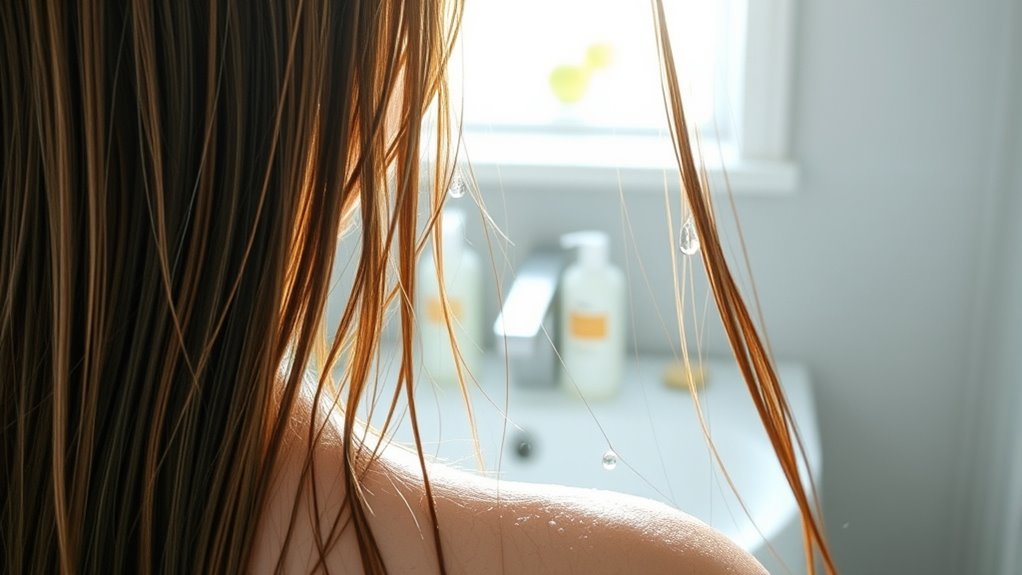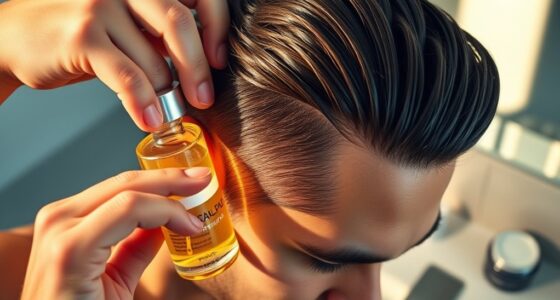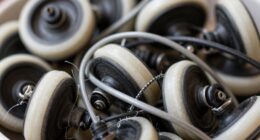How often you wash your hair depends on your hair type, scalp condition, and daily habits. If your scalp is oily or you sweat a lot, you might need to wash more frequently, while dry or sensitive scalps benefit from less frequent washes to avoid irritation. Pay attention to signals like itchiness or oiliness—they guide your routine. To discover more personalized tips that keep your hair healthy and balanced, explore further.
Key Takeaways
- Hair washing frequency varies based on scalp type, hair texture, and personal lifestyle needs.
- Oily scalps may require daily or every-other-day washing to control excess oil.
- Dry or sensitive scalps benefit from less frequent washing to prevent dryness and irritation.
- Environmental factors like pollution and sweating can increase the need for more regular cleansing.
- Listening to your scalp’s signals helps determine the optimal washing routine for healthy hair.

Deciding how often to wash your hair depends on your hair type, scalp condition, and lifestyle. Your hair washing frequency isn’t a one-size-fits-all answer; it requires understanding what works best for you. If your scalp tends to get oily quickly, you might need to wash more often to keep your scalp feeling fresh and prevent buildup. Conversely, if your scalp is dry or sensitive, washing too frequently can strip away essential oils, leading to irritation or increased dryness. Pay attention to how your scalp reacts over time—if it feels greasy by midday, more frequent washing might be necessary. If it feels tight, flaky, or irritated, reducing wash days could improve scalp health and comfort. Using an appropriate shampoo and air quality can also contribute to a healthier scalp and hair environment. Your hair type plays a significant role in determining how often you should wash. Those with straight or oily hair often find they need to wash daily or every other day to control excess sebum. Curly, textured, or dry hair types tend to be more delicate and can often go longer between washes without feeling greasy. In fact, washing less frequently can help preserve natural oils, keeping your curls moisturized and reducing frizz. If you have color-treated or chemically processed hair, limiting wash frequency helps protect the integrity of your hair and maintain vibrant color longer.
Adjust your hair washing routine based on your scalp’s oiliness and sensitivity for healthier hair.
Lifestyle choices also influence your hair washing routine. If you exercise frequently or sweat heavily, you might need to wash more often to remove sweat and buildup. People who work in environments with dust, pollution, or strong odors may also find increased washing necessary to maintain scalp cleanliness and overall hair health. On the other hand, if your days are generally low-key and you don’t get dirty or sweaty, washing less often can prevent unnecessary stripping of oils, helping your scalp stay balanced and healthy. Ultimately, finding the right hair washing frequency is about listening to your scalp’s signals. If your scalp feels itchy, flaky, or excessively oily, it’s time to adjust your routine. Using gentle shampoos suited to your scalp and hair type can also make a big difference in maintaining scalp health. Remember, washing too often isn’t always better; it can lead to dryness, irritation, and even increased oil production as your scalp tries to compensate. Conversely, washing too infrequently can cause buildup, dullness, and scalp issues. Striking a balance tailored to your individual needs will keep your scalp healthy, your hair clean, and your routine effective.
Frequently Asked Questions
Can Washing Hair Daily Damage My Scalp?
Washing your hair daily can potentially damage your scalp if it disrupts the scalp oil balance. Overwashing strips away natural oils, leading to dryness and irritation, which may affect hair hydration and overall health. To avoid this, pay attention to your scalp’s signals and choose gentle shampoos. If your scalp feels dry or itchy, reduce washing frequency to help maintain a healthy oil balance and keep your hair hydrated.
Does Washing Frequency Affect Hair Color Longevity?
Washing frequency definitely impacts hair color longevity, especially for color-treated hair. If you wash too often, you risk fading hair dye faster, causing your vibrant color to dull sooner. To keep your hair dye fresh and vibrant, wash less frequently, use sulfate-free shampoos, and rinse with cooler water. This helps preserve the color and maintain the health of your hair, ensuring your color-treated hair stays bright longer.
Are There Specific Shampoos for Different Hair Types?
Think of shampoos like a toolbox—each type is designed for specific hair needs. You should choose shampoos for your hair type—oily, dry, curly, or fine—to optimize your haircare routines. Look for shampoo ingredients that suit your scalp and hair texture. For example, moisturizing shampoos for dry hair or clarifying ones for oily scalp. Picking the right shampoo makes your hair smoother, healthier, and easier to manage.
How Does Washing Hair Influence Scalp Dandruff?
Washing your hair regularly helps control scalp dandruff by removing excess scalp oil, which can promote dandruff growth. When you wash too infrequently, oil buildup fosters scalp irritation and flakes. Conversely, washing too often might strip natural oils, causing dryness and more dandruff. Find a balance that suits your scalp type, using anti-dandruff shampoos when needed, to effectively manage dandruff and maintain scalp health.
Can Washing Too Infrequently Cause Hair Loss?
You might not realize it, but washing too infrequently can lead to hair loss causes like dandruff buildup and poor scalp health. When your scalp isn’t cleaned regularly, excess oil and dead skin clog hair follicles, weakening hair strands and potentially causing hair loss. Keep your scalp healthy by finding a balance that suits your hair type, preventing issues that could contribute to hair loss. Regular washing supports strong, healthy hair growth.
Conclusion
So, if you’re not washing your hair often enough, your scalp might turn into a greasy disaster zone or a dandruff battlefield! On the flip side, washing too often could strip away all your natural oils, leaving your hair as brittle as dry hay. Find that sweet spot, and your hair will stay healthier than a superhero’s cape. Trust me, once you get it right, you’ll feel unstoppable—like a hair-washing ninja on a mission!









